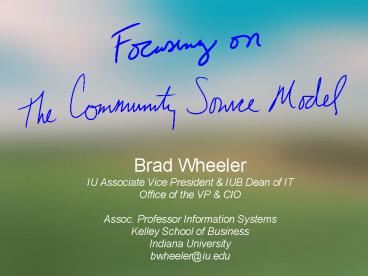Brad Wheeler - PowerPoint PPT Presentation
1 / 25
Title:
Brad Wheeler
Description:
Brad Wheeler. IU Associate Vice President & IUB Dean of IT. Office of the VP ... lots of staff with questionable grooming habits 'in case' something goes wrong. ... – PowerPoint PPT presentation
Number of Views:27
Avg rating:3.0/5.0
Title: Brad Wheeler
1
- Brad Wheeler
- IU Associate Vice President IUB Dean of IT
- Office of the VP CIO
- Assoc. Professor Information Systems
- Kelley School of Business
- Indiana University
- bwheeler_at_iu.edu
2
(No Transcript)
3
(No Transcript)
4
(No Transcript)
5
(No Transcript)
6
Questions from Higher Ed
- Can I trust open source applications today?
- Can I trust open source applications tomorrow?
- Who will support it?
- Should I invest or be a free rider?
- When?
- Who will I hold accountable (sue)?
- Does this fit my institution?
Code Coordination Community
7
Code Coordination Models
Stakeholder Coordination Open IP
Community Source Projects
Bundled IP Support
Partnering Organizations
8
(No Transcript)
9
(No Transcript)
10
(No Transcript)
11
(No Transcript)
12
(No Transcript)
13
(No Transcript)
14
Coordination Models
Thanks to Dr. Charles Severance, Lead Architect,
Sakai Project
15
Pure Commercial Software
Communication between Stakeholders and
Shareholders is in the form of large checks.
- Shareholders
- Desire to maximize profit
- Make most decisions so as to maximize profit
- Have final say in terms of developer priority -
usually priorities have to do with profit
- Stakeholders
- Expect that because so much money is being paid
that there is some form of indemnification in
return (no one was ever fired for buying Cisco) - Are willing to pay handsomely so as to be able to
get good nights sleep - Tell end users that they are using the best
product that money can buy - Can resist end-user demands for change because
company is unwilling to change
- Commercial Developers
- Understand critical link between revenue and
paycheck - Focus is on stability of software rather than on
features - as such features change slowly - Do not even know stakeholders
There is almost no direct communication between
stakeholders and developers because then the
developers might actually start changing (and
breaking) the software.
Most Powerful in Structure
16
Pure Open Source Software
- Open Source Developers
- Type 1 Passionate individual who finds work on
this software interesting - Type 2 Paid consultant whose job it is to get a
open-source software to pass test suites so as to
show that there is an open-source reference
implementation - Teams formed based on personal time and
motivation or a commercial venture with a
short-term agenda - Effort level ebbs and flows depending on
commercial needs of the moment - Performance and reliability are second-order
issues - Cool features and programming chops rule the day
(and night)
- Stakeholders
- Love the notion that they have free software
and source code. - Hate the fact that there is no one to call - if
it breaks you get to keep both pieces - Look at open source solutions at a moment in time
and make a yes/no decision based on state of the
software at the moment of analysis - Must self-indemnify by keeping lots of staff with
questionable grooming habits in case something
goes wrong. - Once open source is chosen, may find it hard to
sleep at night. - Probably wont get to keep the savings form the
open source decision beyond this fiscal year.
There is virtually no communication at all
between Stakeholders and Developers because they
operate in completely orthogonal areas of the
space-time continuum and if they ever ran across
one another - they would not even recognize that
they were in the same species.
17
Community Source
- Commercial Support
- At least the core developers have to be
responsible for reliability and performance - The core developers have a boss who can be
complained to - Can pay some money to the Core for some
indemnification - Can make money from secondary stakeholders
- Secondary Stakeholders
- At least the core developers have to be
responsible for reliability and performance - The core developers have a boss who can be
complained to - Can pay some money to Core to get
indemnification - Can contribute to the Core in kind
- Can join the core with enough commitment
- Can pay Commercial Support for extra
indemnification.
- Core Stakeholders
- It turns out that they actually have a lot of
money and programmers - If they pool resources, we would be instantly
larger than many small commercial RD operations. - Tired of writing big checks, and begging for
features - Form coalition of the committed
- Get quite excited when developers start doing
what they are told. - Must learn that this is harder than it looks -
must gain company-like skills. - Actually responsible for both the development and
production of the software.
- Core Developers
- Work for the stakeholders so they want to make
the Stakeholders happy
- Open Source Developers
- Can participate in the process based on
contributions and chops
Issues How can this be kept stable after
founders reduce commitment? If successful, what
stops this from going commercial? What is the
right license for the IP produced as part of the
Core? What types of software is appropriate for
this? Payroll software?
18
(No Transcript)
19
(No Transcript)
20
(No Transcript)
21
(No Transcript)
22
(No Transcript)
23
(No Transcript)
24
(No Transcript)
25
(No Transcript)































